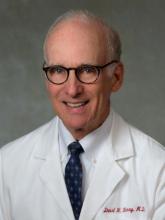In this episode, Charles E. Geyer, MD, of Virginia Commonweath University joins guest host Jame Abraham, MD, of the Cleveland Clinic to discuss the KATHERINE trial and its impact on the treatment of HER2-positive breast cancer.
And Ilana Yurkiewicz, MD, talks about whether it's better for physicians to be vague about prognosis.
Show notes
By Hitomi Hosoya, MD, PhD
Resident in the department of internal medicine, University of Pennsylvania Health System
The idea behind the KATHERINE trial was to determine whether trastuzumab emtansine (T-DM1) provides superior outcomes over trastuzumab in HER2-positive breast cancer patients who had residual disease after neoadjuvant therapy. Eligible patients had HER2-positive breast cancer with T1-T4 and N0-N3, and had residual disease after standard neoadjuvant therapy. The primary endpoint was invasive disease-free survival (IDFS), which was 22.2% in the trastuzumab group and 12.2% in the T-DM1 group (hazard ratio, 0.50). The authors concluded that T-DM1 was superior to trastuzumab in this population.
References:
- N Engl J Med. 2019;380:617-28. https://www.nejm.org/doi/full/10.1056/NEJMoa1814017
- J Clin Oncol. 2017 Jan 10;35(2):141-8. https://www.ncbi.nlm.nih.gov/pubmed/28056202
Contact us: podcasts@mdedge.com

